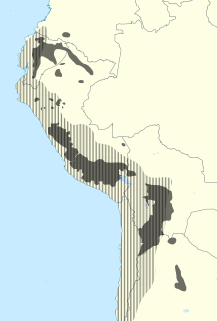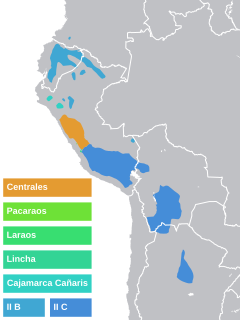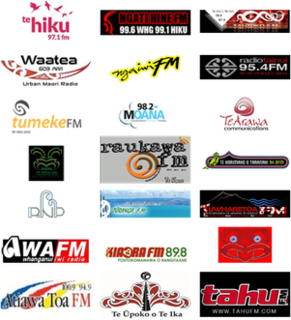Related Research Articles

This article is about the demographic features of the population of Peru, including population density, ethnicity, education level, the health of the populace, economic status, religious affiliations and other aspects of the population.

Quechua, usually called Runasimi in Quechuan languages, is an indigenous language family spoken by the Quechua peoples, primarily living in the Peruvian Andes. Derived from a common ancestral language, it is the most widely spoken pre-Columbian language family of the Americas, with a total of probably some 8–10 million speakers. Approximately 25% of Peruvians speak a Quechuan language. It is perhaps most widely known for being the main language family of the Inca Empire. The Spaniards encouraged its use until the Peruvian struggle for independence of the 1780s. As a result, Quechua variants are still widely spoken today, being the co-official language of many regions and the second most spoken language family in Peru.
WNYC is the trademark, and a set of call letters shared by a pair of nonprofit, noncommercial, public radio stations located in New York City and owned by New York Public Radio, a nonprofit organization that did business as "WNYC RADIO" until March 2013.
Fresh Air is an American radio talk show broadcast on National Public Radio stations across the United States since 1985. It is produced by WHYY-FM in Philadelphia, Pennsylvania. The show's host is Terry Gross. As of 2017, the show was syndicated to 624 stations and claimed nearly 5 million listeners. The show is fed live weekdays at 12:00 noon ET. In addition, some stations carry Fresh Air Weekend, a re-programming of highlights of the week's interviews. In 2016, Fresh Air was the most-downloaded podcast on iTunes.
CBC Radio is the English-language radio operations of the Canadian Broadcasting Corporation. The CBC operates a number of radio networks serving different audiences and programming niches, all of which are outlined below.

Radio Havana Cuba is the official government-run international broadcasting station of Cuba. It can be heard in many parts of the world including the United States on shortwave frequencies. Radio Havana, along with Radio Rebelde, Cubavision Television and other Cuban Radio and Television broadcasts to North, Central and South America via free-to-air programming from the Hispanisat satellite over the Atlantic Ocean and via Internet streaming.
Language revitalization, also referred to as language revival or reversing language shift, is an attempt to halt or reverse the decline of a language or to revive an extinct one. Those involved can include parties such as linguists, cultural or community groups, or governments. Some argue for a distinction between language revival and language revitalization. It has been pointed out that there has only been one successful instance of a complete language revival, that of the Hebrew language, creating a new generation of native speakers without any pre-existing native speakers as a model.
WFMU is a listener-supported, independent community radio station licensed to East Orange, New Jersey. It broadcasts at 91.1 Mhz FM in Jersey City, New Jersey. It also broadcasts to the Hudson Valley, the Lower Catskills, western New Jersey, and eastern Pennsylvania from Mount Hope, New York at 90.1 WMFU, and to New York City and Rockland County at 91.9 FM. Overall, it covers most of the New York metropolitan area, and presents a freeform radio format. It is the longest-running freeform radio station in the U.S. The station's main terrestrial transmitter is located in West Orange, New Jersey.

WBUR-FM is a public radio station located in Boston, Massachusetts, owned by Boston University. WBUR is the largest of three NPR member stations in Boston, along with WGBH and WUMB-FM. WBUR produces several nationally distributed programs, including Car Talk, On Point, Only a Game, Here and Now and Open Source, and previously produced The Connection. RadioBoston, launched in 2007, is WBUR's only purely local show. WBUR's positioning statement is "Boston's NPR News Station".

Telewizja Polska S.A. is a Polish state media corporation. It is the largest Polish television network, although it is currently the least trusted network in Poland due to its strong pro-government bias. About a third of TVP's income comes from a broadcast receiver licence, while the rest is covered by government subsidies, commercials and sponsorships.

Quechua people or Quecha people, may refer to any of the indigenous people of South America who speak the Quechua languages, which originated among the indigenous people of Peru. Although most Quechua speakers are native to the country of origin, there are some significant populations living in Peru, Ecuador, Bolivia, Chile, Colombia and Argentina.

Afropop Worldwide is a radio program that presents the musics of Africa and the African diaspora. The program is produced by Sean Barlow for World Music Productions in Brooklyn, New York City, New York. It is hosted by the veteran Cameroonian broadcaster Georges Collinet, who previously attained renown for his work with Voice Of America.

Kichwa is a Quechuan language that includes all Quechua varieties of Ecuador and Colombia (Inga), as well as extensions into Peru. It has an estimated 1,000,000 speakers.

Media Lengua, also known as Chaupi-shimi, Chaupi-lengua, Chaupi-Quichua, Quichuañol, Chapu-shimi or llanga-shimi, is a mixed language with Spanish vocabulary and Kichwa grammar, most conspicuously in its morphology. In terms of vocabulary, almost all lexemes (89%), including core vocabulary, are of Spanish origin and appear to conform to Kichwa phonotactics. Media Lengua is one of the few widely acknowledged examples of a "bilingual mixed language" in both the conventional and narrow linguistic sense because of its split between roots and suffixes. Such extreme and systematic borrowing is only rarely attested, and Media Lengua is not typically described as a variety of either Kichwa or Spanish. Arends et al., list two languages subsumed under the name Media Lengua: Salcedo Media Lengua and Media Lengua of Saraguro. The northern variety of Media Lengua, found in the province of Imbabura, is commonly referred to as Imbabura Media Lengua and more specifically, the dialect varieties within the province are known as Pijal Media Lengua and Angla Media Lengua.
Israel Radio International or Reka is the radio service of the Israeli Public Broadcasting Corporation (IPBC) for immigrants and listeners abroad.
Amazonian Kichwas are a grouping of indigenous Kichwa peoples in the Ecuadorian Amazon, with minor groups across the borders of Colombia and Peru. Amazonian Kichwas consists of different ethnic peoples, including Napo Kichwa and Canelos Kichwa. There are approximately 419 organized communities of the Amazonian Kichwas. The basic socio-political unit is the ayllu. The ayllus in turn constitute territorial clans, based on common ancestry. Unlike other subgroups, the Napo Kichwa maintain less ethnic duality of acculturated natives or Christians.
Radio in Argentina is an important facet of the nation's media and culture. Radio, which was first broadcast in Argentina in 1920, has been widely enjoyed in Argentina since the 1930s. Radio broadcast stations totaled around 150 active AM stations, 1,150 FM stations, and 6 registered shortwave transmitters. An estimated 24 million receivers were in use in 2000.

Te Whakaruruhau o Ngā Reo Irirangi Māori is a New Zealand radio network consisting of radio stations that serve the country's indigenous Māori population. Most stations receive contestable government funding from Te Māngai Pāho, the Māori Broadcast Funding Agency, to operate on behalf of affiliated iwi (tribes) or hapū (sub-tribes). Under their funding agreement, the stations must produce programmes in the Māori language, and must actively promote Māori culture.

Rosa Palomino Chahuareses is an Aymara Indigenous leader, journalist, and human rights activist in Peru. In 2014, the Ministry of Culture presented her with an award for her work in developing community radio for women.

The Quechua Alliance is a community organization that promotes and celebrates Andean culture in the United States.
References
- 1 2 "Kichwa Hatari: A Revival on the Airwaves | USC Center on Public Diplomacy". www.uscpublicdiplomacy.org. Retrieved 2019-08-27.
- 1 2 3 "Meet the Young Ecuadorians Behind the First Kichwa-Language Radio Show in the US". Remezcla. 2016-12-23. Retrieved 2019-08-27.
- ↑ "Radio program in New York aims to keep Kichwa language alive". INDIANZ.COM. Retrieved August 27, 2019.
- ↑ Semple, Kirk (2014-08-15). "By Using Language Rooted in Andes, Internet Show's Hosts Hope to Save It". The New York Times. ISSN 0362-4331 . Retrieved 2019-08-27.
- ↑ "Awardees – The Quechua Alliance". thequechua.org. Retrieved 2020-06-09.